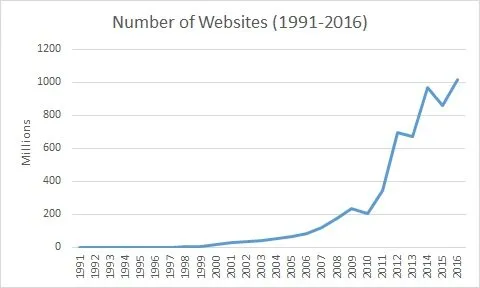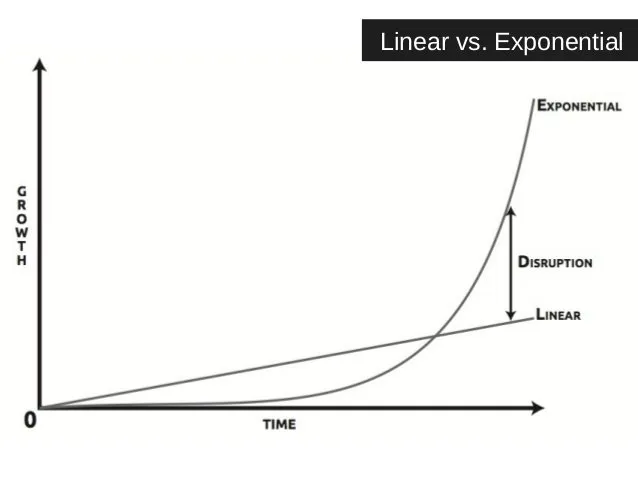
This guy's happy for a reason: He profited well from the dematerialization and demonetization of content.
For years I have watched the Print-Media empires crumble, as the digital age disintermediated the gate-keepers and content begin moving ‘into the cloud’.
I believe micro-transactions and smart-contracts, now available thanks to the advent of blockchain technology, can radically transform the current publishing status-quo, in-turn elevating a content platform into something much bigger than even facebook.
Below is a description of how to add a near endless revenue-stream to steemit.com and democratize the redundant publishing/advertising models of today.
First, to quickly cover of some context, I’m using Peter Diamandis’ 6 D’s of Exponentials to better explain what has happened to publishers and their content, as it became digitized.

Digitized:
Anything that becomes digitized, hops onto an exponential growth curve. In publishing, this was the migration of print based content into the cloud.

First content was digitized and publishers did not know what the implications were. Many publishers, like IDG, FairFax, Bloomberg and Rupert’s Kingdom, largely ignored the dawn of the internet as it didn’t seem lilke it was moving fast at the time. ‘Why does the company need a website?’ was a common question among executives. We all know the story.
Disruptive:
When an industry is first digitized, it enters a period of ‘deceptive growth’. Where things look like they are not moving very fast. This is typically because infrastructure is being built and revenue models are evolving alongside changing user behavior.

I recommend watching ‘Middle Men’ (2009), a comedy/drama chronicling Jack Harris, one of the pioneers of internet commerce. This movie portrays well just how much money was at stake and how ‘cowboy’ the landscape was when online credit-cards payments first became a thing. Much like Blockchain today. Credit Cards on the internet, was the disruptive digitization of online commerce and a few entrepreneurial publishers ask themselves if this technology also gives birth to a viable publishing model. A few brave titans of print experimented and it took years for the industry and models to consolidate. A time which felt like not much was happening to the outside observer. Which is why this is referred to as the 'deceptive' stage. Ultimately the concept of online payments was highly disruptive to conventional publishers. All of a sudden there was another choice, another medium to deliver premium content through.
Dematerialize:
In publishing, this is the removal of the physical friction in distribution of content and it’s implications on consumption, reduction in costs etc.

Everything is dematerializing and it created an explosion in consumer choice. This was hugely disruptive in publishing because in a very short period, users had access to a massive ocean of content. A new need was born, search. Google capitalized this extremely well and search became it’s own multi billion dollar service. Value moved from creating content to serving content. This rise of curation, especially custom curation tailored relevant to each individual, is why social media was born and grew so fast. Facebook serves you your localized/preferred network feed.
Demonetize:
Skype decimated long distance call charges. iTunes killed the record store. Craigslist butchered publisher’s classified ads revenue, the last vestige of hope conventional print publishers had.

Content has demonetized in the form of revenue moving from publishers to social media and search platforms. Google, facebook and linkedin users are treated like cattle, effectively selling the eyeballs your content produces to advertisers. Users get nothing and platform operators rein supreme.
Democratization:
This is where marketplaces explode. By 2020 we will have at least 5 Billion internet users.

That's a lot more content published and consumed. A whole lot more advertising & search revenue for Google, FB, Linkedin, etc.
There are 3 key parties involved in the democratization of Publishing:
- - Advertisers
- - Platforms
- - Publishers
Currently, publishers post content on platforms and are struggling to be remunerated. Platforms act as gate-keepers, receive free content from users and sell the audience to the advertisers.
During the democratization stage, ‘laws of network effects’ kick in on a global scale and the collective user base (the publisher), shapes platform design.
The catalyst for the true Democratization of publishing needs to be the platform itself. If a platform and it's community, correctly self-realizes it's fit within a democratized landscape, it can transform from a middle-man to a value-added application. First mover advantage will assist greatly also.
The $65B question.

Migrating a portion of the $65B++ of annual advertising revenue from platforms back into publishers pocket would not be possible without a Blockchain for smart-contracts and micropayments.
But how would it look like? Nobody likes advertising!

Advertisers directly pay users to see an advert.
- Adverts are 'covered-up' until clicked on by a user.
- The brand is stated but not their logo or advert, until a user chooses to view the advert.
- Platform acts as catalyst, not gatekeeper, to send $ from advertisers to users.
Some considerations on the Users (Publishers/Readers):
- There would need to be a user-based, site-wide, Kill-Switch. If users really don't want to see adverts, press a button and they don't get served/participate.
- I use an example of $0.01 in these mock adverts but considering this mechanic allows greatly boosts user engagement (ie advertisers are pretty much guaranteed those ads are seen by humans), highly targeted adverts would yeild well.
Some considerations on the Advertisers:
- The user interface to book a campaign, would need to be as simple as using google, facebook or linkedin.
- Google in particular has done a great job of leveling the playing field for advertisers, in the sense that no-matter who you are, the corner store down the road, a media agency or a large corporate, everybody books through the same portal and has the same options and pricing.
- Highly attractive new medium with never before seen engagement mechanics.
- Advertisers will not spend money if forced to hold Steem or some other native token. Steem is only purchased when their campaign is running, automatically, per advert served. That is the platform's main function.
Some considerations on the The Platform:
- If steemit.com did this it would need to invest in some basic infrastructure, to service users on one side and advertisers on the other. This requires a transparent, and thoughtful, yet simple solution design.
- Outside of the obvious addition of advertising space, the platform would need build a proper ad-serve module to make booking and monitoring performance of campaigns as easy as Google makes it.
- A secure payment channel, offering loading of balances by CryptoCurrency, Bank-Wire & Credit Card, would also be essential for bigger clients.
Here is a basic outline of the mechanics:

- Advertisers use ad-module to deposit funds. Ad-module acts similar to reddit or google where it's largely self-service. Stripe or BrainTree for fiat and shapeshift for Cryptocurrencies.
- Once there is a Fiat or Bitcoin balance they can start booking their module. Selecting tags, audiences, geographies and uploading advertising materials.
- Once the campaign is running, the platform auto buys Steem from the open market to auto-pay users for viewing content. Advertisers will not accept buying any Cryptocurrency upfront so this needs to be done on a per-serve basis. Advertiser account balances and campaign stats need to be displayed in USD or other familiar currencies.
- Steemit users choose what adverts to click on and are immediately reward. Not based on click-through (which could be an additional reward).
- Steemit platform would need to run several scripts to avoid over-saturation of any one advertiser and abuse from bots.
- .... a new unicorn is born.
This would give steemit.com a badly needed external revenue stream, which in my opinion, is the missing piece. There's $65B up for grabs and I can guarantee you, now that the technology is available, if Steemit doesn't drive this democratization, somebody else will.
I estimate it would cost about 50k, on the cheap side, to build a simple proof-of-concept.
The publishing world has taken 20 years to go from digitization to now democratization and it's effects will be awesome and global.
I've fired this past the Steemit founders of course and am now reaching out to the users on Steemit for their comments.
So, what do you think Steemit?
Disclaimer: These opinions are my own and do not represent the opinion of any of my companies.
